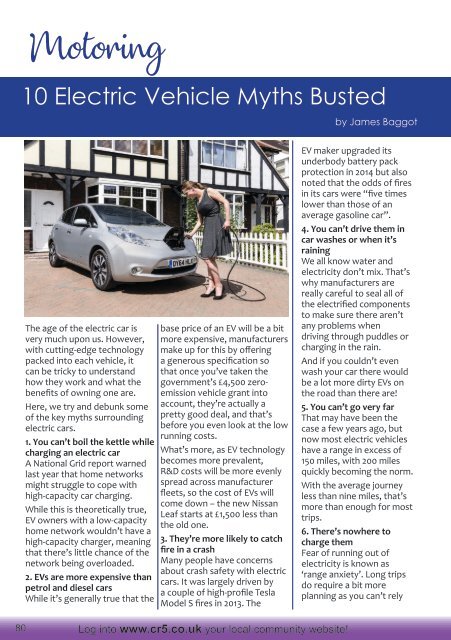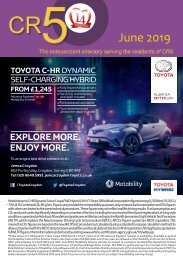CR5 Issue 157 June 2018
A local community magazine containing local business advertising along with interesting reads, puzzles and What's On in the local area
A local community magazine containing local business advertising along with interesting reads, puzzles and What's On in the local area
You also want an ePaper? Increase the reach of your titles
YUMPU automatically turns print PDFs into web optimized ePapers that Google loves.
Motoring<br />
10 Electric Vehicle Myths Busted<br />
by James Baggot<br />
The age of the electric car is<br />
very much upon us. However,<br />
with cutting-edge technology<br />
packed into each vehicle, it<br />
can be tricky to understand<br />
how they work and what the<br />
benefits of owning one are.<br />
Here, we try and debunk some<br />
of the key myths surrounding<br />
electric cars.<br />
1. You can’t boil the kettle while<br />
charging an electric car<br />
A National Grid report warned<br />
last year that home networks<br />
might struggle to cope with<br />
high-capacity car charging.<br />
While this is theoretically true,<br />
EV owners with a low-capacity<br />
home network wouldn’t have a<br />
high-capacity charger, meaning<br />
that there’s little chance of the<br />
network being overloaded.<br />
2. EVs are more expensive than<br />
petrol and diesel cars<br />
While it’s generally true that the<br />
base price of an EV will be a bit<br />
more expensive, manufacturers<br />
make up for this by offering<br />
a generous specification so<br />
that once you’ve taken the<br />
government’s £4,500 zeroemission<br />
vehicle grant into<br />
account, they’re actually a<br />
pretty good deal, and that’s<br />
before you even look at the low<br />
running costs.<br />
What’s more, as EV technology<br />
becomes more prevalent,<br />
R&D costs will be more evenly<br />
spread across manufacturer<br />
fleets, so the cost of EVs will<br />
come down – the new Nissan<br />
Leaf starts at £1,500 less than<br />
the old one.<br />
3. They’re more likely to catch<br />
fire in a crash<br />
Many people have concerns<br />
about crash safety with electric<br />
cars. It was largely driven by<br />
a couple of high-profile Tesla<br />
Model S fires in 2013. The<br />
EV maker upgraded its<br />
underbody battery pack<br />
protection in 2014 but also<br />
noted that the odds of fires<br />
in its cars were “five times<br />
lower than those of an<br />
average gasoline car”.<br />
4. You can’t drive them in<br />
car washes or when it’s<br />
raining<br />
We all know water and<br />
electricity don’t mix. That’s<br />
why manufacturers are<br />
really careful to seal all of<br />
the electrified components<br />
to make sure there aren’t<br />
any problems when<br />
driving through puddles or<br />
charging in the rain.<br />
And if you couldn’t even<br />
wash your car there would<br />
be a lot more dirty EVs on<br />
the road than there are!<br />
5. You can’t go very far<br />
That may have been the<br />
case a few years ago, but<br />
now most electric vehicles<br />
have a range in excess of<br />
150 miles, with 200 miles<br />
quickly becoming the norm.<br />
With the average journey<br />
less than nine miles, that’s<br />
more than enough for most<br />
trips.<br />
6. There’s nowhere to<br />
charge them<br />
Fear of running out of<br />
electricity is known as<br />
‘range anxiety’. Long trips<br />
do require a bit more<br />
planning as you can’t rely<br />
80 Log into www.cr5.co.uk your local community website!

















